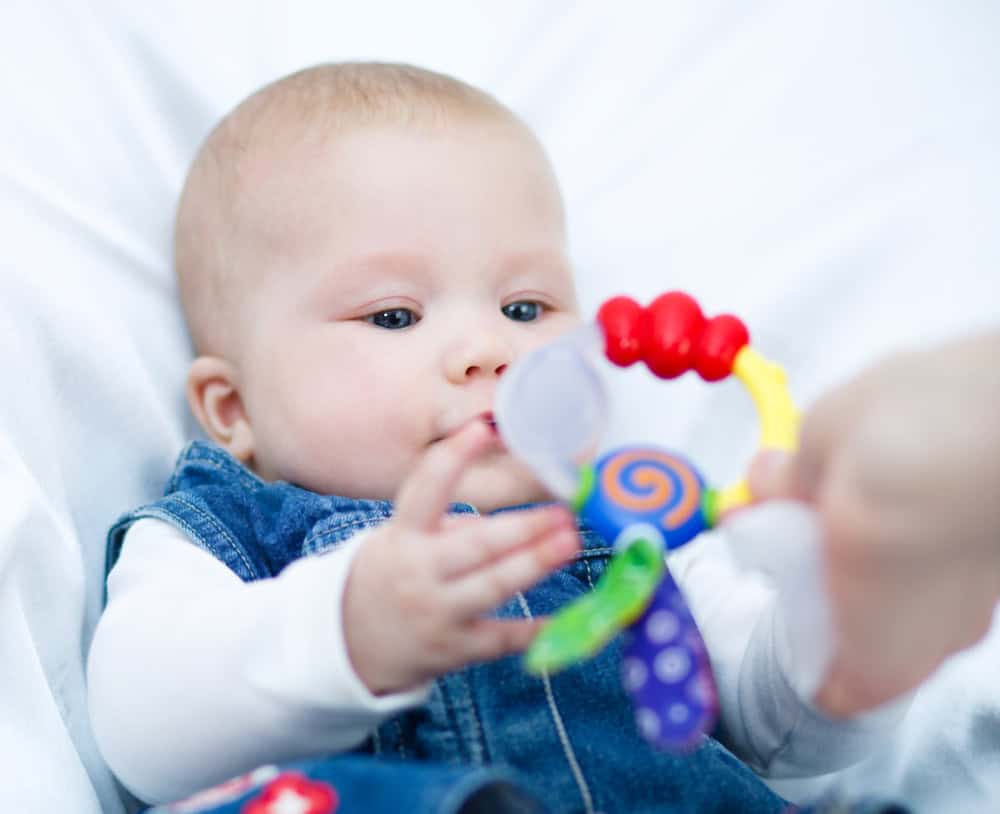Fine motor skills refer to the small movements that occur in the hands.
You may not notice your baby doing much with their hands yet but someday those fine motor skills will help them with performing everyday tasks like buttoning shirts, turning pages, and even gripping a pencil.
Helping your baby develop their fine motor skills is a key part of early childhood development – and it doesn’t have to involve complex activities.
In fact, simple daily routines and playtime can be incredibly effective.
If you want more EASY ways to encourage development all day long you will want to check out Inspire Learning for Babies and Toddlers.
Let’s get started with these eight easy ways to integrate fine motor skill development into your baby’s daily activities.
(This post may contain affiliate links. To read our full disclosure policy click here.)

1. Engaging with Fingerplays and Songs
Sing the classics.
Songs and fingerplays like “Itsy Bitsy Spider,” “Head, Shoulders, Knees, and Toes,” and “Twinkle Twinkle Little Star” provide your baby with the opportunity to mimic the movements.
They will need to see it modeled lots before they actually try to imitate.
This helps with hand-eye coordination and the muscle control needed for more precise actions.
Not only are songs like this great for fine motor skills they are also a wonderful way to work on language development.

2. Exploring Different Textures
Bring on the laundry!
Simple tasks, such as folding laundry, can introduce your baby to various textures when you encourage them to touch and feel different types of fabric.
This enhances their sensory experience while the repeated movement of picking up and handling various materials boosts their fine motor skills.
For little babies, this means you may just gently place the different fabrics while older babies may be able to grasp and pull items out of the laundry basket.
3. Reaching for the Stars
During playtime, place toys slightly out of your baby’s reach.
This will motivate them to grab, hold, and pull objects towards them – a fantastic way to practice their fine motor skills.
It’s also a great exercise for gross motor development and helps to boost confidence when they accomplish the reach.
4. Grocery Store Adventures
The grocery store can be a great outing for your baby.
When you’re at the store, give your baby items to hold.
Things like a lemon or a package of noodles to shake (supervised of course) gives your baby the opportunity to explore something new.
Also, narrate what you’re doing and label the items as you put them in the cart – language development is also a part of the grand scheme!

5. Hands-On Reading
Make reading a priority.
Spend some time every day exploring board books with your baby.
Point out different features on the page and have them touch and feel the textures of objects as you read or describe the pictures.
This not only helps to refine their ability to turn pages but also introduces them to the world of literature and storytelling.
You can see some of my favorite books for babies HERE.
6. Supervised Solo Play
Independent, but not alone.
Allow your baby to have some solo playtime with safe toys like stacking cups, shape sorter, or soft blocks.
This gives them the chance to explore and manipulate objects without your help, which is an important step in the development of problem-solving and fine motor skills.

7. Tummy Time
Quality time on their tummy is so important!
Tummy time isn’t just for strengthening core muscles and learning to crawl – it also encourages fine motor development.
Arrange toys like rattles and teethers in front of your baby to reach for and grasp, which promotes the use of their hands in various ways.
8. High Chair Independence
Clean-up time!
If your baby is starting to eat solid foods, offer them a damp cloth to clean their high chair tray after a meal.
This wiping motion is a simple yet effective way to work on their fine motor skills, while also teaching them the basics of cleaning up after themselves.

I Hope You Enjoy These Ideas!
Remember, the key is to be patient, present, and proactive in incorporating these activities into your daily routine.
For more innovative and inspiring activities that can further enhance your baby’s learning and development, be sure to check out Inspire Learning for Babies and Toddlers.
This resource is packed with ideas designed to stimulate young minds, making learning an enjoyable and enriching experience for both you and your baby.

Related Posts You Will Enjoy
Top Baby Toys from 0-12 Months
Should you use signs with your baby?

Kayla O’Neill has a master’s degree in education as well as a bachelor’s degree in special education with an emphasis in early childhood education. She has been working as a developmental therapist with babies and toddlers in early intervention since 2012. She is also a mom with two young children.